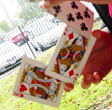 Freshman Grant Menon reveals what is truly important behind those fancy tricks
Freshman Grant Menon reveals what is truly important behind those fancy tricks
It all starts with a rabbit, a dove or an empty box. One minute it's there, and the next it's gone. We're left wondering, puzzled by the impossible, yet completely enthralled by the mystery. That's the charm that lies in the wonders of magic. A pack of cards, practice and the presentation are all that freshman Grant Menon needs to make an unforgettable magic show completely captivating.
"You start out with a great opener to hook them," Menon said, "and you slowly build up in the levels of amazing-ness until the end and you have a really good closer."
Menon found his passion for magic in middle school and performed for the first time in seventh grade. He first became involved in magic with freshman Kevin Guo. Guo has helped Menon grow in several aspects of magic and now Menon often shows him new tricks that he is experimenting with for suggestions.

"Before he was doing kiddy tricks that [didn't] involve any manipulation of the hands and something that you can just buy and do," Guo said. "But now he does more advanced stuff."
Now Menon can present a show comparable to the professionals. Friends and teachers who are aware of his talent often ask him to perform shows for their parties or their students. He has done a show for a birthday party as well as for a middle school class for an ex-teacher.
Partner freshman Brendan Duffy who also has developed a similar passion for magic often works with Menon.
"First we start by planning: what do we want to do, what is asked of us, how long it needs to be," Duffy said. "Then we go through our list of all our tricks."
A major focus for Menon and Duffy is the general effect they have on audiences. They plan different shows for different types of people based on what kinds of tricks the audience would find entertaining. Some of them include tricks involving cards, coins, ropes and silks.
For now the two magicians concentrate mainly on close-up magic.
"Close-up magic [uses] smaller objects close up to the audience," Menon said. "We try to incorporate stage illusions which is what you will see the professional magicians do on television. We [also] try to incorporate comedic magic because it's usually a good thing and makes things a lot better."
A magic show is only good if the magician and the audience share chemistry. By involving comedy and illusions, the magician invites an audience response of either laughter or shock and confusion. The more the audience interacts, the more the relationship between the two grows. And that's where presentation comes in.
"If you learn to present it properly, it keeps people entertained," Menon said. "A lot of magicians make the mistake of having magic be about them and being all about their performance but it's really kind of the bond the magicians and the audience experiences."








